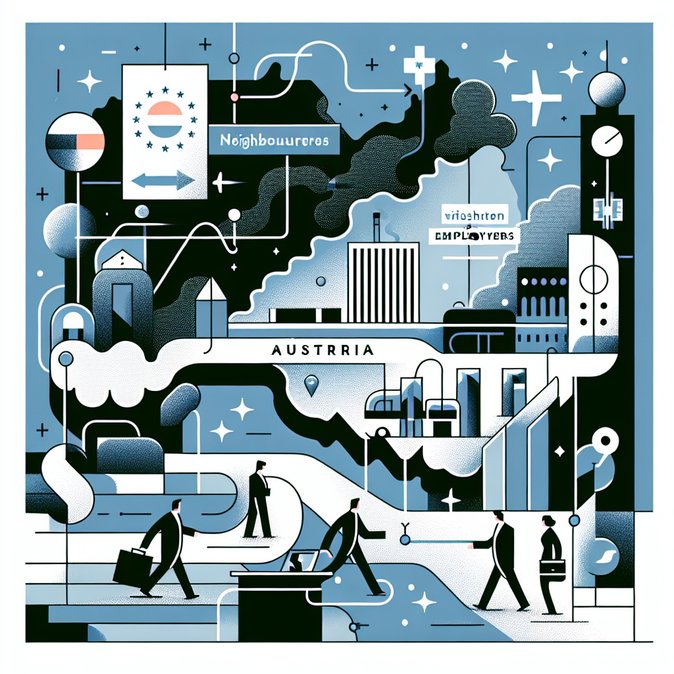
Austria will launch a brand-new residence permit next month for non-EU nationals who live just across the border but hold job offers in Austrian territory. Published on 17 November by the Federation of Electrical and Electronics Industries (FEEI), the notice confirms that the ‘Aufenthaltstitel Grenzgänger’ will enter into force on 1 December 2025 following its passage in Federal Law Gazette I 2025/70.
The permit targets commuters from neighbouring countries—such as Serbian tech workers living in Hungary or Ukrainian engineers settled in Slovakia—who already have permanent residence rights where they live. To qualify, applicants must present (1) a long-term residence title from an adjacent state, (2) an Austrian employment contract and (3) a certificate from the Public Employment Service (AMS) confirming that labour-market tests have been cleared. Initial validity ranges from six to twelve months and can be renewed.
![Austria Unveils ‘Grenzgänger’ Permit for Non-EU Frontier Workers Starting 1 December]()
For Austrian employers, the scheme fills a critical gap: EU law makes it easy for EU citizens to commute, but third-country nationals had to obtain a full relocation permit, an option many rejected. The new title lets companies in border districts—especially around Vienna/Bratislava, Salzburg/Bavaria and Carinthia/Slovenia—tap talent pools without triggering costly relocation packages.
Immigration advisers expect roughly 250 approvals in the first year, but note that demand could rise sharply in automotive and semiconductor clusters once word spreads. HR teams should be ready to issue bilingual contracts and to schedule biometrics appointments during the worker’s first week in Austria. Payroll departments must also code the assignees correctly: Grenzgänger remain tax-resident abroad, so income-tax withholding follows double-tax treaties rather than standard Austrian rules.
Unions have voiced concern that the permit circumvents local hiring pipelines, but the government argues that the AMS review step protects domestic job-seekers. For now, the business community sees the measure as a surgical fix to a chronic skills shortage—one that could become a template for other EU states with cross-border labour markets.
The permit targets commuters from neighbouring countries—such as Serbian tech workers living in Hungary or Ukrainian engineers settled in Slovakia—who already have permanent residence rights where they live. To qualify, applicants must present (1) a long-term residence title from an adjacent state, (2) an Austrian employment contract and (3) a certificate from the Public Employment Service (AMS) confirming that labour-market tests have been cleared. Initial validity ranges from six to twelve months and can be renewed.

For Austrian employers, the scheme fills a critical gap: EU law makes it easy for EU citizens to commute, but third-country nationals had to obtain a full relocation permit, an option many rejected. The new title lets companies in border districts—especially around Vienna/Bratislava, Salzburg/Bavaria and Carinthia/Slovenia—tap talent pools without triggering costly relocation packages.
Immigration advisers expect roughly 250 approvals in the first year, but note that demand could rise sharply in automotive and semiconductor clusters once word spreads. HR teams should be ready to issue bilingual contracts and to schedule biometrics appointments during the worker’s first week in Austria. Payroll departments must also code the assignees correctly: Grenzgänger remain tax-resident abroad, so income-tax withholding follows double-tax treaties rather than standard Austrian rules.
Unions have voiced concern that the permit circumvents local hiring pipelines, but the government argues that the AMS review step protects domestic job-seekers. For now, the business community sees the measure as a surgical fix to a chronic skills shortage—one that could become a template for other EU states with cross-border labour markets.


